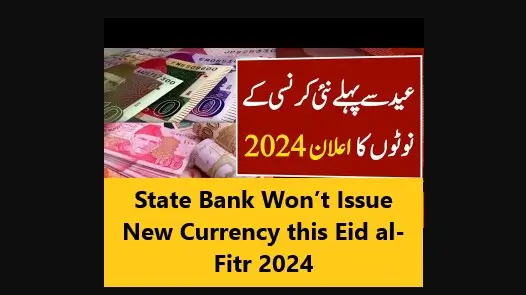State Bank Won’t Issue New Currency this Eid al-Fitr 2024.
No Fresh Eid Cash? State Bank of Pakistan Stirs Up Eid Traditions
This Eid al-Fitr, Pakistanis might be surprised to find their wallets lacking the crisp, brand new banknotes typically associated with the festivity.
In a significant departure from tradition, the State Bank of Pakistan (SBP) has reportedly decided against issuing new currency notes for Eid 2024.
This unexpected move is likely to impact Eid celebrations and raise questions about the central bank’s reasoning.
Breaking with Tradition:
For years, the issuance of new currency notes has been a cherished tradition leading up to Eid. Families eagerly awaited the arrival of fresh bills to distribute as Eidi (gifted money) and enhance the festive spirit. This year, however, the wait seems in vain, leaving many disappointed.
Disappointment for the Public and Banks:
The news has caused a stir among citizens who had already begun frequenting banks in anticipation of acquiring new notes. Private banks, too, have refrained from distributing fresh currency, citing the State Bank’s policy as the primary reason.
Emergence of a Currency Mafia:
This unexpected development has created a void that unscrupulous elements are attempting to exploit. A “currency mafia” has reportedly emerged, capitalizing on the public’s desire for new notes by selling them illegally in the black market, particularly near the State Bank building.
Black Market Boom and Inflated Prices:
Historical trends suggest a surge in black market activity around Eid, with new banknotes being sold at exorbitant prices. It’s not uncommon for these dealers to demand an additional Rs. 200-300 for a simple bundle of Rs. 10 notes.
State Bank’s Silence and Potential Reasons:
The State Bank of Pakistan has yet to officially comment on this significant shift in policy. However, speculation posits several possible reasons for this decision:
- COVID-19 Concerns: A continued focus on curbing the spread of COVID-19 might be a factor. New notes could potentially act as virus carriers, prompting the central bank to prioritize public health.
- Promoting Digital Transactions: The SBP could be using this opportunity to encourage a shift towards digital transactions, which would reduce reliance on physical cash and potentially enhance financial inclusion.
- Cost-Effectiveness: Printing and distributing new notes requires significant resources. The SBP might be aiming for greater economic efficiency, considering the existing stock of notes might be deemed sufficient.
A Call for Transparency:
While these are possible explanations, an official statement from the State Bank clarifying their decision would be crucial to mitigate public confusion and speculation.
Adapting to Change:
Whether the decision stems from public health concerns, a push towards digitalization, or other motives, this Eid might require some adaptation. Here are some potential alternatives:
- Utilizing Existing Currency: Citizens can utilize the existing currency in circulation for Eidi and other festive expenses.
- Embracing Digital Payments: Exploring digital payment methods like mobile banking or e-wallets could offer a convenient and secure alternative for exchanging money.
- Creativity with Eidi: Gifts, heartfelt messages, or experiences can complement Eidi, creating a richer and more meaningful celebration.
The State Bank of Pakistan’s decision to forgo issuing new Eid currency is undoubtedly a significant change. While it may disappoint some, it could also serve as a catalyst for broader societal changes. Embracing digital transactions and focusing on the true spirit of Eid beyond the physical appearance of currency could mark a positive shift in Pakistani traditions.
Note: The information above might not be accepted 100%. Please verify from your own sources. We will not be responsible for any kind of loss due to our content.
For more news, please visit Munafa Marketing.




